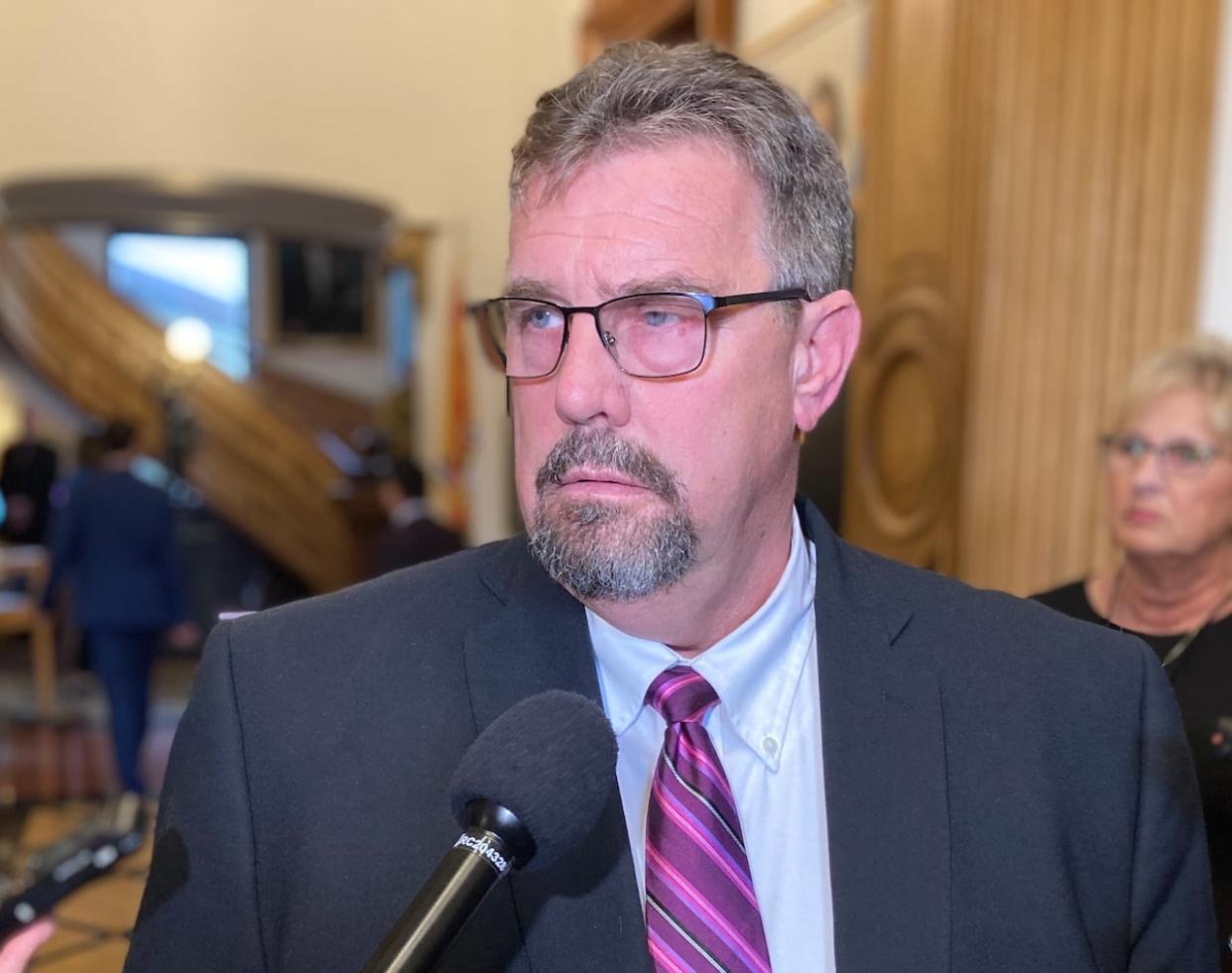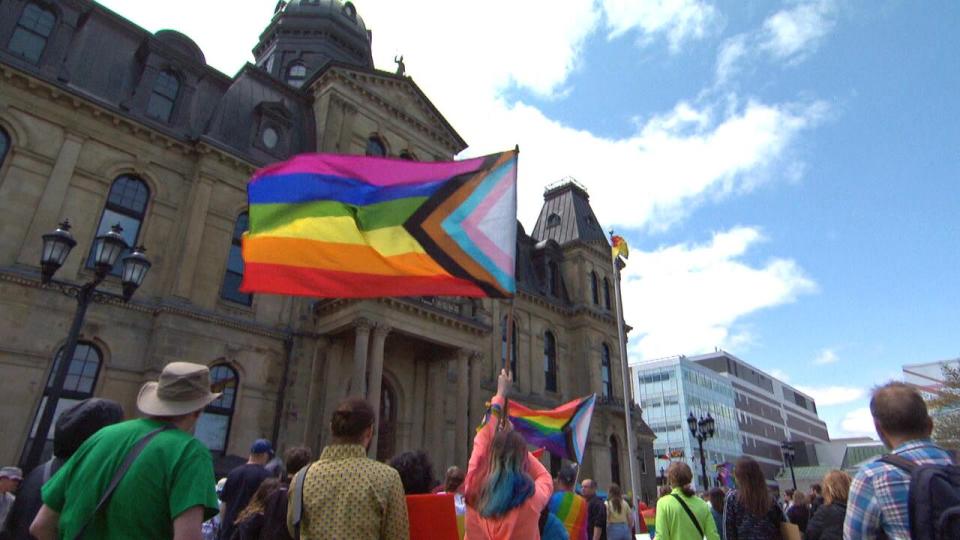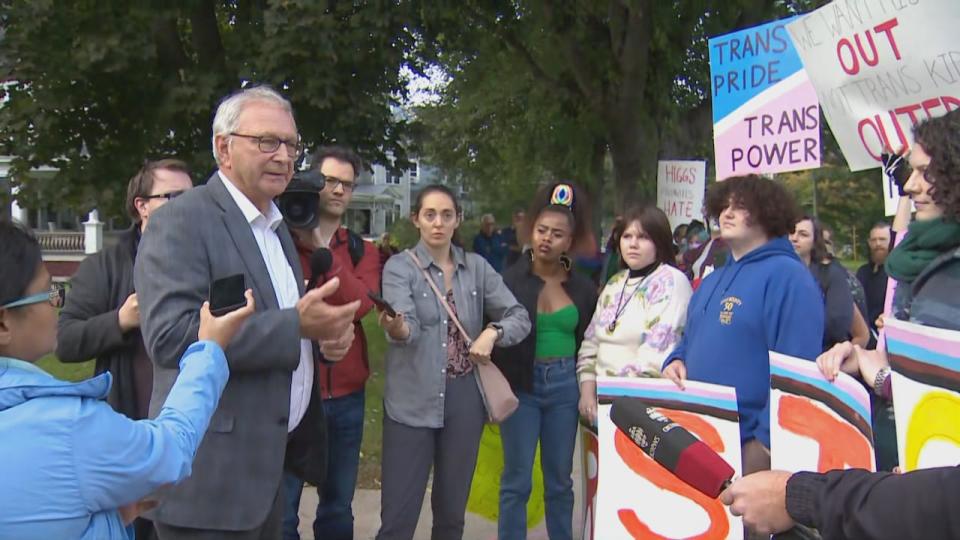Majority of N.B. districts didn't change policy on gender identity, as minister asked

New Brunswick's new school policy on gender identity has not applied uniformly across the province.
In fact, the majority of school districts still have their own policies, despite letters of warning from the minister.
Education Minister Bill Hogan's mandate for parental consent before staff can use certain children's pronouns got pushback from school psychologists, child advocates and district education councils.
Months later, the battle continues. Hogan recently threatened to remove Anglophone East's policy from its own website.

Opponents of the review of Policy 713 demonstrated outside the New Brunswick legislature last summer. (Radio-Canada)
Last June, Hogan changed Policy 713 to make it mandatory to get parental consent before school staff use a child's chosen name and pronoun, if the child is under 16.
This new policy was called potentially discriminatory and dangerous by medical professionals, school psychologists, children's rights advocates and civil liberty groups. It is currently the subject of a lawsuit and grievances from the unions representing school psychologists and teachers.
Hogan and Premier Blaine Higgs said this policy is meant to protect the parents' right to be involved in their children's lives.
District education councils, made up of elected members of the community who are usually parents, have the power to make policies that are "consistent with, or more comprehensive than" Policy 713, according to the policy itself.
All councils, except Anglophone North, created their own policies at the beginning of this school year. The districts emphasized prioritizing the well-being of the student. All added some leeway, where teachers would be allowed to use a child's chosen pronoun verbally in the classroom if parental involvement is in the works or not possible.

Premier Blaine Higgs met with pro-LGBT policy protesters who showed up outside a Progressive Conservative Party fundraising event last September. (Ed Hunter/CBC)
In October, Hogan sent strongly worded letters to six councils, saying their policies are contravened the Education Act, and were inconsistent with his policy. He asked they remove their policies and gave them a deadline.
Anglophone South and West changed their policies by Hogan's deadline. Anglophone East refused.
All three francophone districts worked together to create a uniform policy they all follow. Their policy is modelled after the one suggested by child and youth advocate Kelly Lamrock, where teachers are to respect all students' pronouns from Grade 6 and up. For students younger than Grade 6, the decision is made on a case-by-case basis.
Anglophone East's policy says staff must respect students' chosen names and pronouns in "daily interactions."
"This respect for the student's wishes will be extended while efforts to 'obtain consent to talk to the parent' are being made," the policy says. "School personnel may not withhold use of the student's preferred name and/or pronouns as a means of 'obtaining consent to talk to the parent.'"
'I will, as Minister, take the corrective actions'
In letters to Hogan, the Anglophone East council said its policy is, in fact, not breaking any rules, because Policy 713 never explicitly says what should happen while the child is attempting to speak to their parents. The council said its policy can also be considered "more comprehensive" than the provincial policy.
Hogan's letters to Anglophone East became more insistent in February. In that letter, he maintained that the district is contravening the Education Act and gave a deadline of March 28 to make changes.
"If the DEC fails to comply with these requests in the time specified, I will, as Minister, take the corrective actions of repealing the district policy and having all copies removed from DEC website," Hogan wrote.
In reply, Anglophone East said it will not be changing their policy. The council asked for a meeting with Hogan instead.
According to the Education Department, officials did meet with the Anglophone East council on March 27.
"To respect the process, details of the discussions between the two parties will not be disclosed," the department said.
The department did not answer questions about other districts that have "inconsistent" policies, and what action the minister plans to take.
Anglophone East did not respond to requests for comment on this issue. The district's policy is still on its website on Tuesday.
West, South rework policies
To appease Hogan's demands in September, Anglophone South rescinded a motion that said staff should respect all students' pronouns. Instead, the district's policy reads: "The district shall ensure all staff respect the Canadian Charter of Rights and Freedoms, New Brunswick Human Rights Act, Right to Information and Protection of Privacy Act and the Positive Learning Environment Policy."
Anglophone West removed parts of its policy that said staff should respect students' pronouns while parental consent is being sought.
The policy emphasizes the Charter, the Human Rights Act and the section of Policy 713 that says "All members of the school environment have the right to self-identify and express themselves without fear of consequences and with an expectation of dignity, privacy, and confidentiality."


